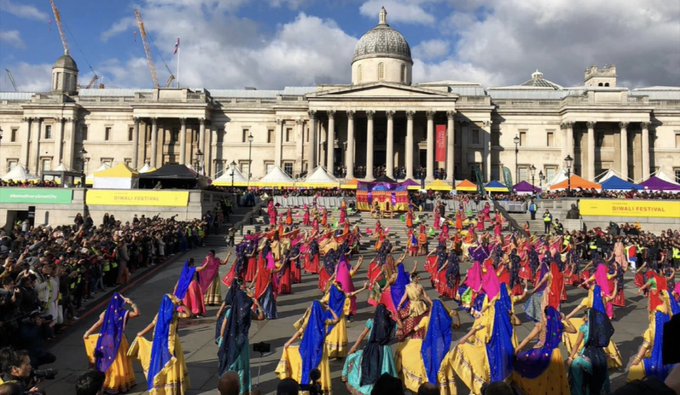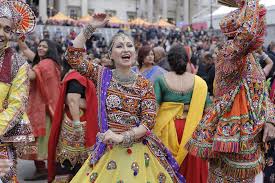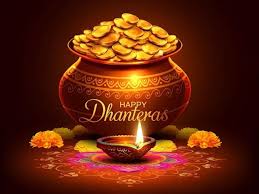When is Diwali 2024 in the UK? Date, Time, and Celebration Tips
Diwali 2024 in the UK falls on Sunday, October 31st, with Lakshmi Puja scheduled between 17:04 and 18:42. Discover how to celebrate the Festival of Lights in London!

The Significance of Diwali
Diwali's origins are steeped in rich stories and traditions. One of the most well-known tales is that of Lord Rama's return to Ayodhya after defeating the demon king Ravana. To welcome him home, the people illuminated the city with oil lamps, or diyas, symbolizing the victory of light over darkness.
Additionally, Diwali is dedicated to Goddess Lakshmi, the deity of wealth and prosperity. It is believed that she visits homes during this time, blessing them with fortune. Understanding these narratives enhances the experience of performing worship and celebrating this cherished festival.
Looking for the perfect gifts to celebrate Diwali in the UK? Check out our article on Diwali Gift Ideas in the UK for unique and heartfelt suggestions that will delight your family and friends this festive season!
What You’ll Need for Diwali Worship
To perform Diwali worship in London, gather the following items: Diya (oil lamps): To symbolize the light that dispels darkness. Rangoli materials: Coloured powders or flower petals for decoration. Worship plate (puja thali): A plate for your offerings. Fresh flowers: Particularly marigolds, for decoration. Fruits and sweets: Traditional offerings for the deities. Incense sticks and a holder: To create a fragrant atmosphere. A small idol or picture of Goddess Lakshmi and Lord Ganesha: Essential for the worship. A bell: To invoke blessings during the ceremony.
Step-by-Step Guide to Diwali Worship
Step 1: Clean and Prepare Your Space Begin by thoroughly cleaning your home and the area where you will perform the worship. Cleanliness is vital in Hindu culture, especially during festivals. Once your space is tidy, enhance it with a beautiful Rangoli design at the entrance or in front of your worship area. This artistic expression not only adds beauty but also welcomes positive energy into your home.
Step 2: Set Up Your Worship Plate Prepare your worship plate by arranging: - The idol or picture of Goddess Lakshmi and Lord Ganesha at the center. - Fresh flowers surrounding the idol. - Fruits and sweets as offerings. - Diyas, incense sticks, and your bell ready for use.
Step 3: Light the Diyas and Incense As evening approaches, light the diyas and place them around your home. This act symbolizes the dispelling of ignorance and negativity. Next, light the incense sticks to create a sacred and fragrant atmosphere, enhancing the spiritual ambiance.
Step 4: Invoke the Deities Start your worship by ringing the bell and reciting a prayer. You can chant the mantra: "Om Gan Ganapataye Namah" (to Lord Ganesha) to remove obstacles. Follow this by invoking Goddess Lakshmi with: "Om Shreem Maha Lakshmyai Namah" (for prosperity and blessings).
Step 5: Offerings and Aarti Place the fruits and sweets before the deities as offerings. After making your offerings, perform the Aarti: Hold the worship plate with the diya and rotate it in front of the idols. Sing a simple Aarti song, such as "Om Jai Lakshmi Mata," to honor the deities.
Step 6: Express Gratitude After the Aarti, take a moment to express gratitude for the blessings in your life. Conclude with a prayer for health, happiness, and prosperity for yourself and your loved ones.
Step 7: Share the Joy Once your worship is complete, share the sweets and fruits with family and friends. This act of sharing reflects the essence of Diwali—community, love, and joy.
Celebrating Diwali in London
Living in London provides a unique opportunity to engage with a diverse multicultural community. Various organizations and communities host Diwali events and fairs where you can participate in traditional dances, enjoy delicious Indian cuisine, and experience the joy of Diwali with others. These collective celebrations foster a sense of unity and understanding among people from different backgrounds.

Conclusion: Embrace the Spirit of Diwali
By following this step-by-step guide to performing Diwali worship in London, you can create a meaningful and enriching experience in your home. Whether celebrating with family or friends, this festival is a wonderful opportunity to reflect, rejoice, and reconnect with your cultural roots. As you light your diyas and perform your worship, remember that Diwali is more than just rituals; it’s a celebration of life, love, and light. Happy Diwali! May your home be filled with joy, prosperity, and warmth this festive season!
While Diwali 2024 brings light and joy this year, it’s never too early to start planning for future celebrations. If you’re already curious about next year’s festivities, check out our detailed guide on Diwali 2025 date, time, and celebrations in the UK. From updated dates and timings to exciting events and traditional customs, we’ll ensure you’re well-prepared to celebrate Diwali 2025 with the same enthusiasm and devotion. Also, don’t forget to explore our guide on Lakshmi Puja 2025 date and significance in the UK to make sure your celebrations are perfectly aligned with the auspicious timings. Don’t miss out on staying informed about upcoming festivals and traditions!
Recent Posts
4 Days of Pongal 2025, Dates, Rituals, Story, Timings
Pongal is a four-day festival celebrated in Tamil Nadu and across Tamil communities globally to express gratitude to nature for a bountiful harvest. The festival, dedicated to the Sun God, Surya, marks the beginning of the Tamil month of Thai and the harvest season. In 2025, Pongal will be celebrated from Tuesday, January 14 to Friday, January 17. The four days are: Bhogi (January 14, 2025), dedicated to Lord Indra and marking the clearing of old possessions; Thai Pongal (January 15, 2025), the main day for thanking the Sun God for the harvest; Mattu Pongal (January 16, 2025), honoring cattle for their role in agriculture; and Kaanum Pongal (January 17, 2025), a day for family reunions and social celebrations. These days are filled with rituals, significance, and joy, reflecting the rich cultural heritage of Tamil communities worldwide.

Ahoi Ashtami 2024 UK | Is Ahoi Ashtami on 23rd or 24th | Celebrating the Wellbeing of Children
Ahoi Ashtami, a revered festival for mothers, will be celebrated on Wednesday, October 23, 2024. This festival holds special significance for women who fast for the health and wellbeing of their children. Traditionally observed for sons, the modern-day observance includes prayers for the wellbeing of both sons and daughters. The fast is broken during twilight after sighting the stars in the sky, which will occur at 18:24 in London on this day. For those who follow the custom of breaking the fast after moonrise, the moon will rise at 22:14 on Ahoi Ashtami.
Ahoi Ashtami 2025 UK: Date, Time, and Rituals for Wellbeing of Children
Ahoi Ashtami, a significant Hindu festival dedicated to the wellbeing of children, will be celebrated on October 13, 2025. The festival, observed mainly by mothers, involves fasting and performing prayers for the health and prosperity of sons and daughters. The Ahoi Ashtami Puja Muhurat for 2025 is from 18:11 to 19:30 (UK time). This auspicious occasion is marked by devotion and rituals, with many families gathering to perform the prayers at home or at community temples.
Chaitra Navratri 2025 : Date , Calendar and Events in UK
Chaitra Navratri 2025 will be celebrated from March 30 to April 6. For Hindus in the UK, this auspicious nine-day festival is not just a time for religious devotion, but also a meaningful cultural celebration marking the Hindu New Year and the arrival of spring. Also known as Vasanta Navratri, it honours the nine forms of Goddess Durga, symbolizing strength, renewal, and feminine power. In this article, we explore the dates, rituals, significance, and special events happening across the UK for Chaitra Navratri 2025.

Dhanteras 2024 UK: Date, Auspicious Time, Traditions, and Celebrations
Dhanteras 2024 will be celebrated on October 29 in the UK. The auspicious time for Dhanteras puja is from 7:04 PM to 8:27 PM. Discover the significance, traditions, and events happening in London to celebrate this festive occasion.